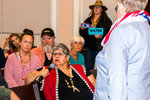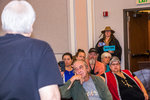








By Alex Brown
abrown@chronline.com
In another meeting packed with concerned residents, Lewis County commissioners gathered Tuesday to discuss what options they have to address mounting opposition to the proposed Crystal Geyser water bottling plant in Randle.
The meeting with the county prosecuting attorney’s office and Community Development department was attended by more than 40 people, many of them Randle residents or members of the Cowlitz Tribe.
“This is not a good fit for Lewis County,” said commissioner Gary Stamper, whose district includes the project site. He also noted the limitations commissioners face in offering political opposition. “I’m not saying they can’t (build the plant), but we’re going to continue to carry this on and do our research. I encourage this group to come to every possible meeting to let the Department of Ecology and the county know who you feel about this.”
The proposal outlined by Crystal Geyser would construct a 100,000 square foot bottling facility that would extract 400 gallons a minute from springs on the company’s newly purchased Peters Road property along the Cowlitz River. The company has obtained a preliminary permit for exploratory drilling from the state, and is awaiting a state withdrawal permit that would allow it to pull out the water. To actually build the plant, Crystal Geyser would need a special use permit from Lewis County, a process determined by an independent hearing examiner and not elected officials.
While that bureaucratic process — which is expected to take many months, if not years — hangs in the balance, commissioners are asking their legal experts just what they can do for the constituents who are coming to them for help. The answer is still unclear.
One possibility that county leaders said is still on the table is direct political action — an ordinance to change zoning or impose extraction limits within the county. It’s unclear if commissioners have explored specific options or have a timeline for taking action. It’s possible they’re not eager to signal a potential strategy, as Crystal Geyser could circumvent that by filing for the county permit before the change is finalized.
“It seems likely that we’ll be asked to look at such a thing, because the citizens will want it,” said civil deputy prosecutor Eric Eisenberg. “And we’ll look at it. … (But) if (Crystal Geyser files) an application before you have finalized your legal change, then they’ve vested or grandfathered to the prior law. And then you have a process that’s going to not stop them anyway.”
Stamper said he would be willing to consider a policy fix as well.
“We need to look at all our options. I’m not sure what that is going to be,” he said. “If this is something that the will of the people — that the people are passionate about — whatever that code change, zoning, we need to look at all of those.”
Eisenberg also urged caution for commissioners’ public approach to the project. There may be appropriate times for county leaders to weigh in on the matter, he said — particularly during the state’s public comment period for the withdrawal permit — but declaring outright opposition to the development could open the county up to legal liability, as Crystal Geyser could file a lawsuit claiming it had not been given a fair process.
While commissioners held back from pledging to block the project, they also made clear that they shared the concerns of the residents who showed up Tuesday. Those issues range from aquifer depletion to water conditions in the river to habitat to truck traffic to noise to eyesores.
“I would love to comment on Facebook, but I can’t,” said county commissioner Edna Fund.
According to Eisenberg, the best time for county leaders to voice their concerns may be during the state Department of Ecology’s public comment process for the withdrawal permit.
“(If) Lewis County and the commissioners say what they think is accurate based on what the constituents are telling them, that’s not going to be against the law,” he said. “What is potentially against the law is if commissioners publicly agree with constituents that a project should not be allowed to happen, then it makes it look like anything else they do on the project is tainted by that decision.”
If the state does grant Crystal Geyser the right to withdraw the water, it would be up to the county to determine a special use permit that would allow for the construction of the plant. While an appointed hearing examiner will render the final decision, county staff will present a report analyzing the project — including whether it’s a good fit for the neighborhood, weighing the input of nearby residents.
Craig Jasmer, a Randle resident who has been leading opposition to the project, said officials at the Department of Ecology had told him they would take into account the opinion of Lewis County officials as they decide whether the water extraction meets the permitting requirement of being in the “public interest.” While the state permit is the only piece of the process happening now, he urged the county to take preventative action with an ordinance to change its zoning.
“We also want to talk about the land use and why it’s possible to put a water bottling plant in East Lewis County in a rural zone. It just doesn’t make sense,” he said. “What do we have to do to make sure that the zoning code matches the intent of the (Lewis County) Comprehensive Plan?”
The meeting featured a tense moment when Teri Graves, a member of the Cowlitz Tribe, made herself heard as commissioners were about to go into executive session — a portion of the meeting closed to the public. Speaking up from the back of the room, she urged commissioners to listen to Patty Kinswa-Gaiser, a member of the Cowlitz Tribal Council who was also in attendance. As a representative from a sovereign nation, Kinswa-Gaiser had a right to speak, she said.
Commissioner Bobby Jackson apologetically said the meeting did not provide for public comment, as officials began to leave the room for the closed-door session, prompting Graves to call his denial “disrespectful.”
As the crowd began to stir, commissioner Edna Fund smoothed things over by opting to skip the executive session, instead choosing to stand among the crowd and pass a microphone around to hear their thoughts.
Kinswa-Gaiser thanked Fund for the gesture, then said she believed the project likely would disturb a cultural site of the Cowlitz people — which could provide another legal avenue to stop it.
“That plant, they say they’re taking (the water) from a spring. If there’s a spring, you can bet that our people — that’s where they chose to build a camp,” she said. “I’m really putting my hopes that this will be a big help to stop this. … I’m really hoping to bring this to the tribe to start historic preservation as one of the key elements of stopping this water plant.”
The Cowlitz Tribal Council is meeting Saturday, and Kinswa-Gaiser said she hoped to add the Crystal Geyser issue to the agenda.
Ruth Peterson, legislative assistant to state Sen. John Braun, R-Centralia, also attended the meeting. Braun’s office said Peterson was there to help Braun “stay informed” about a hot-button topic in his district, while noting that the issue is a county matter and not a legislative one at this point.
Meanwhile, Randle resident Phil Brooke thanked commissioners for listening to locals’ concerns and helping them understand the process. He urged them to not use the liability issue as a reason to be hands-off in the future.
“There’s a tendency for county or city legal departments to try to avoid litigation and try to sideline our elected officials,” he said. “I want to challenge you how to figure out how to stay greatly engaged in the issue.”
Jim Merhaut, another resident, said that as a retiree on a fixed income, getting a well re-drilled would be a major financial blow if Crystal Geyser were to deplete the aquifer.
Others expressed worry that Crystal Geyser could bypass the permit process from the county if they receive the state withdrawal permit. Instead of building the bottling plant — for which they would need county approval — they could opt to extract the water directly to tanker trucks or a pipeline.
After hearing all of the concerns, Stamper pledged to be outspoken throughout the process.
“The law is very very difficult and there’s liability issues on comments made,” he said. “One thing about it, I’m not only a county commissioner but a private citizen. I have rights like every other citizen to voice my concerns on a project like this.”
After the meeting, Stamper was heard telling one resident that county ordinances must be presented with 24 hours notice before a vote, except in cases of emergency. The Crystal Geyser situation, the resident said, certainly felt like an emergency.
“It is,” said Stamper. “Oh, it is.”